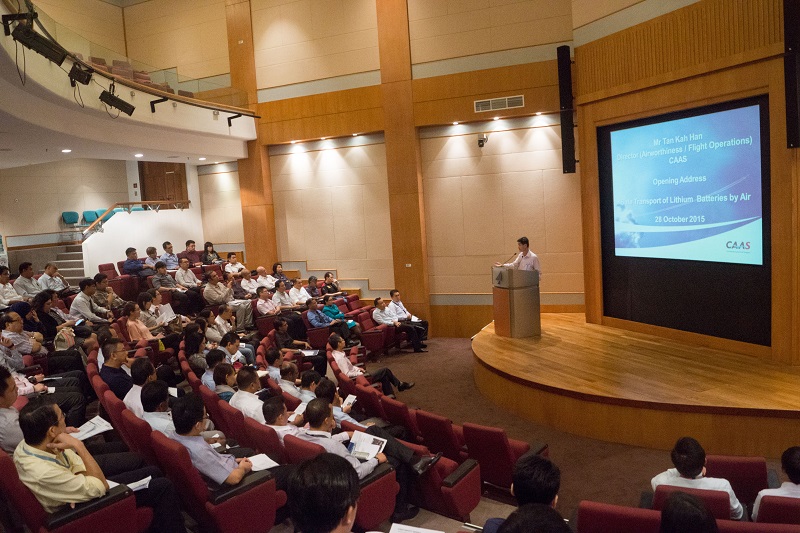
Over 130 industry representatives attended the CAAS Safety Series seminar on the ‘Safe Transport of Lithium Batteries by Air’ held on 28 October 2015 at the Singapore Aviation Academy.
Lithium batteries are commonly transported both as cargo consignments, in postal mail packages, by passengers and crew in their carry-on and checked baggage, or on the person when installed in, packed with equipment or as spare batteries. In recent times, there have been a number of air transport-related incidents linked to lithium batteries and devices powered by lithium batteries reported worldwide. These incidents involved both passenger and cargo aircraft and some have resulted in in-flight fire leading to emergency landings.
To ensure safe transport of lithium batteries by air, the Civil Aviation Authority of Singapore (CAAS) recently revised its advisory circular to guide the industry on the carriage of lithium batteries by air and to advocate the recommendations of the International Civil Aviation Organization (ICAO). In addition, CAAS also jointly organised a CAAS Safety Series seminar with SATS Airport Services Pte Ltd and Lufthansa Cargo AG to inform and update industry stakeholders on the progress of regulations and the necessary implementation procedures by stakeholders to achieve compliance in the carriage of lithium batteries by air.
Over 130 industry representatives including lithium battery manufacturers, shippers, cargo agents, ground handling agents, airlines, and training organisations attended the seminar held on 28 October 2015 at the Singapore Aviation Academy. Lufthansa Cargo AG and SATS Airport Services Pte Ltd provided perspectives from an air operator and operator’s handling agent respectively, while CAAS representatives informed all attendees on the regulations in the Air Navigation Order, violations, common root causes, risks, and enforcement in the carriage of dangerous goods and munitions of war.
CAAS also shared key updates to the regulations including:
- Lithium metal batteries are not permitted to be transported as cargo consignments on passenger aircraft. They may be transported on cargo aircraft only. Air operators, shippers, and their agents must comply with the labeling and documentation requirements.
- Lithium batteries, meeting specific capacity limitations and of not more than four cells or two batteries, when contained in equipment may be permitted in postal mail subject to approval from CAAS. Currently, only Singapore Post Limited may offer lithium metal or lithium ion batteries that are contained in equipment in postal mail to any air operator for carriage by air from Singapore.
CAAS also shared experiences and knowledge gained from past incidents involving lithium batteries. Some common causes of violations highlighted were the failure to train employees in the identification and handling of dangerous goods, miscommunication between shippers and their cargo agents resulting in the omission of dangerous goods information and declaration, and reused packaging materials previously used to contain dangerous goods.
Cargo agents and freight forwarders play a significant role in ensuring that their customers are provided with information on the air transport of dangerous goods including lithium batteries.
“By working together, we can achieve higher standards of safety in the carriage of dangerous goods by air,” said Mr Tan Kah Han, Director of Airworthiness and Flight Operations, CAAS.
In response to concerns in the aviation community, the International Civil Aviation Organization (ICAO) Dangerous Goods Panel has also formed a multi-disciplinary committee to look into the issues in the carriage of lithium batteries by air. Recommendations from this committee may result in more changes to the regulations in the years ahead.
For more information on the safe transport of lithium batteries by air, you may download the Advisory Circular for “GUIDANCE FOR CARRIAGE OF LITHIUM BATTERIES BY AIR” here.